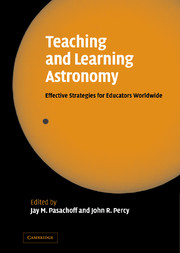Book contents
- Frontmatter
- Contents
- List of illustrations
- Preface
- Introduction
- Part I Astronomy in the curriculum around the world
- Introduction
- 1 Why astronomy is useful and should be included in the school curriculum
- 2 Astronomy and mathematics education
- Open discussion
- 3 Engaging gifted science students through astronomy
- Poster highlights
- Part II Astronomy education research
- Part III Educating students
- Part IV Educating teachers
- Part V Astronomy and pseudoscience
- Part VI Astronomy and culture
- Part VII Astronomy in developing countries
- Part VIII Public outreach in astronomy
- Part IX The education programs of the International Astronomical Union
- Part X Conclusions
- Author index
- Subject index
3 - Engaging gifted science students through astronomy
Published online by Cambridge University Press: 18 May 2010
- Frontmatter
- Contents
- List of illustrations
- Preface
- Introduction
- Part I Astronomy in the curriculum around the world
- Introduction
- 1 Why astronomy is useful and should be included in the school curriculum
- 2 Astronomy and mathematics education
- Open discussion
- 3 Engaging gifted science students through astronomy
- Poster highlights
- Part II Astronomy education research
- Part III Educating students
- Part IV Educating teachers
- Part V Astronomy and pseudoscience
- Part VI Astronomy and culture
- Part VII Astronomy in developing countries
- Part VIII Public outreach in astronomy
- Part IX The education programs of the International Astronomical Union
- Part X Conclusions
- Author index
- Subject index
Summary
Abstract: Astronomy is a subject that poses many deep questions that intrigue students. It can effectively engage gifted and talented students in their school years. Numerous international and Australian schemes utilize astronomy as a means of challenging and extending such students. A variety of approaches include individual or mentored research projects, collaborative group tasks, distance-education courses, and classroom extension. Many schemes utilize access to online resources, communication tools, or remote telescopes. Several schemes are examined as case studies to highlight effective strategies. Some critical factors behind successful initiatives are identified, and implications for possible future schemes are discussed.
Astronomy is a subject that poses many deep questions that intrigue students. If presented in a relevant and stimulating manner it can effectively engage gifted and talented school students. Numerous international and Australian schemes utilize astronomy as a means of challenging and extending such students. The challenge is to learn from the successful schemes and build on them so that more students have access to them.
There is much debate in educational circles as to what constitutes a gifted student. However, Gagné's Differentiated Model of Giftedness and Talent is one that is widely used by educational bodies and so can serve as a means of definition. In this model (Gagné, 1996), gifted students have an aptitude in the top 15 per cent of their age peers in one or more of the following domains: intellectual, creative, socioeffective, sensorimotor and “others.” Talents are skills (or abilities) and knowledge in one or more domains that have been carefully and systematically developed so that students perform in the top 15 per cent of their age group.
- Type
- Chapter
- Information
- Teaching and Learning AstronomyEffective Strategies for Educators Worldwide, pp. 27 - 33Publisher: Cambridge University PressPrint publication year: 2005
- 2
- Cited by



